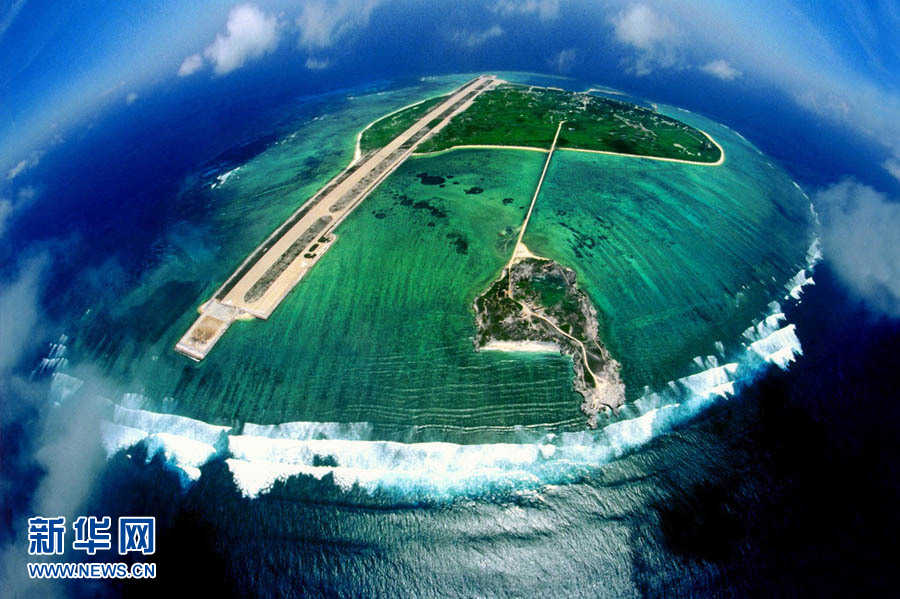


On 14 July, Chinese State Councilor Yang Jiechi gave an interview to state media on the so-called award of the Arbitral Tribunal for the South China Sea arbitration on Thursday, during which he comprehensively elaborated on China's position.
Yang said the Chinese government has released relevant statements and a White Paper stating its solemn position of firmly opposing the arbitration and not accepting or recognizing the award. This position of the central government has the strong support and endorsement from people of various social sectors in China.
Defining that “this award is illegal and invalid in every sense,” the State Councilor tore down the veil of the case, saying that “the arbitration case has been a political farce all along, staged under the cover of law and driven by a hidden agenda.”
The arbitration runs counter to the spirit of international rule of law, puts regional peace and stability in jeopardy, and undermines the interests of the international community, he further explained.
The State Councilor further noted that with most countries in the world clear about the facts, over 70 countries and international and regional organizations have made statements showing their understanding of and support for China's position.
“Sovereignty is a bottom line for China.Big as China is, we cannot afford to give away a single inch of territory that our ancestors have left to us.” the State Councilor said, stating that fully backed by historical and legal evidence, China's territorial sovereignty and maritime rights and interests in the South China Sea have been formed over the course of over two thousand years.
“The award can neither change historical facts nor deny China's claims of rights and interests in the South China Sea. Still less can it waver China's resolve and determination to safeguard territorial sovereignty and maritime rights and interests,” Yang reaffirmed.
He stressed that the crux of disputes between China and the Philippines in the South China Sea are issues concerning territory and maritime delimitation which are not governed by UNCLOS.
By unilaterally initiating arbitration, the Philippine government under Aquino III has gone against its long-standing bilateral agreement with China that disputes in the South China Sea shall be settled through negotiation, violated theDeclaration on the Conduct of Parties in the South China Sea signed in 2002 by China and ASEAN countries, the Philippines included, and breached international law and UNCLOS, Yang said.
“Hence, this arbitration has been illegal since the very beginning. It cannot be seen as an application of international law,” he concluded.
According to him, in disregard of China's staunch position, the Arbitral Tribunal willfully went beyond its authority, turned a blind eye to the history and reality of the South China Sea and misinterpreted relevant stipulations of UNCLOS. “Naturally, such an award can only be illegal and invalid,” said he.
Commenting on the impact of the so-called award on China's dotted line in the South China Sea, Yang said that as early as in 1948, the Chinese government marked the dotted line in the South China Sea on its officially published map, which affirmed China's sovereignty over the South China Sea Islands and maritime rights and interests in their adjacent waters.
“This is a historical fact beyond any doubt,” he reiterated China’s stance, stressing that China's sovereignty and maritime rights and interests in the South China Sea, protected by both international law and UNCLOS, shall by no means be denied by an unwarranted and flawed award.
The South China Sea, important to the Chinese people since ancient times, is our heritage to which our forefathers devoted their wisdom and even lives.The Chinese government remains unwavering in its resolve to safeguard China's territorial sovereignty and maritime rights and interests in the South China Sea, Yang said, adding that the Chinese government and people will remain united and act resolutely to safeguard every inch of land and every swath of waters.
Yang also refuted those accusing China of defying international rules by not accepting or recognizing the award of the Tribunal, clarifying that China's position on the arbitration fully complies with international law.
“This basic fact has been thoroughly elaborated in a series of position papers issued by the Chinese government. The attempt to mount an all-out smear campaign against China by distorting this basic fact has once again exposed the nature of this arbitration, that is, a farce in which certain countries use international law as a cover to pursue their own hidden agenda,” he explained.
The State Councilor emphasized at the same time that China has all along been an active player in building up and enhancing the regional and international order, and the arbitration will not in the slightest way shake China's resolve to pursue the path of peaceful development.
Yang also believed that the South China Sea issue is not an issue between China and ASEAN when talking about the prospect of their future relationship.
He also gave China’s remedy to those specific disputes, saying that Chinawill maintain communication and consultation with those ASEAN member states who are directly concerned to address them in a proper way.China means what it says and follows a consistent policy.
China-ASAEN relations enjoy sound momentum of growth and broad prospects. This year marks the 25th anniversary of China-ASEAN dialogue relations. Over the past quarter century, the China-ASEAN relationship has withstood test of time and produced fruitful outcomes. The State Councilor illustrated that two-way trade has grown from less than US$10 billion 25 years ago to nearly US$500 billion, making China and ASEAN each other's major trading partners.
On China-Philippines ties, he said that bilateral relations have run into serious difficulty as a result of the previous Philippine government's unilateral initiation of the arbitration.
“We call on the new Philippine government to bear in mind the common interests of our two countries and the broader picture of bilateral ties and properly handle relevant issues,” he said.
During the interview, he also criticized the role played by some non-regional countries in the South China Sea issue, saying that the South China Sea arbitration "is a case in point of how non-regional countries interfere in the South China Sea issue."
He said in recent years, certain countries outside the region, driven by their own agenda, have frequently intervened in the South China Sea issue under the pretext of upholding "freedom of navigation" and "maintaining regional peace," leading to an escalation of tension.
"Such highly irresponsible moves have become the major source of risks that affect peace and stability in the South China Sea," Yang said.
He expressed China’s hope that relevant countries will respect the independent choice of China and its neighboring countries in the South China Sea and do more to facilitate sustained peace and stability in the South China Sea, not the contrary.
In the end, Yang underlined that China firmly follows a path of peaceful development, a foreign policy of pursuing friendship and partnership with its neighbors, and a policy of settling disputes peacefully through negotiation and consultation.
“China is ready to settle the disputes through peaceful negotiation with countries directly concerned on the basis of respecting historical facts and in compliance with international law, UNCLOS included.China is ready to discuss with countries concerned about temporary arrangements pending final settlement of the dispute, which include joint development in relevant waters in the South China Sea for mutual benefits and win-win outcomes, so that together we can maintain peace and stability in the South China Sea.” he said at last.
Day|Week

 Cute Dog At Fruit Stand Becomes Latest Internet Sensation
Cute Dog At Fruit Stand Becomes Latest Internet Sensation Thai most beautiful transgender Nong Poy release new photos
Thai most beautiful transgender Nong Poy release new photos Top 10 livable Chinese cities
Top 10 livable Chinese cities The last primitive tribe in China
The last primitive tribe in China China's first intelligent security robot debuts in Chongqing
China's first intelligent security robot debuts in Chongqing A Total of 3,552 Subscribers Vanish In Two Days; YouTube Closes All Doors to Users’ Inquiries
A Total of 3,552 Subscribers Vanish In Two Days; YouTube Closes All Doors to Users’ Inquiries Out of this world! Futuristic UFO-shaped yacht has its own garden and a stunning underwater viewing deck
Out of this world! Futuristic UFO-shaped yacht has its own garden and a stunning underwater viewing deck An old tea house in Chengdu
An old tea house in Chengdu Furious Customer Crushes All the Buns from Vendor Just Because He Was Given the Wrong Flavor
Furious Customer Crushes All the Buns from Vendor Just Because He Was Given the Wrong Flavor 20 post-90s couples hold ’naked marriage‘ in E. China
20 post-90s couples hold ’naked marriage‘ in E. China